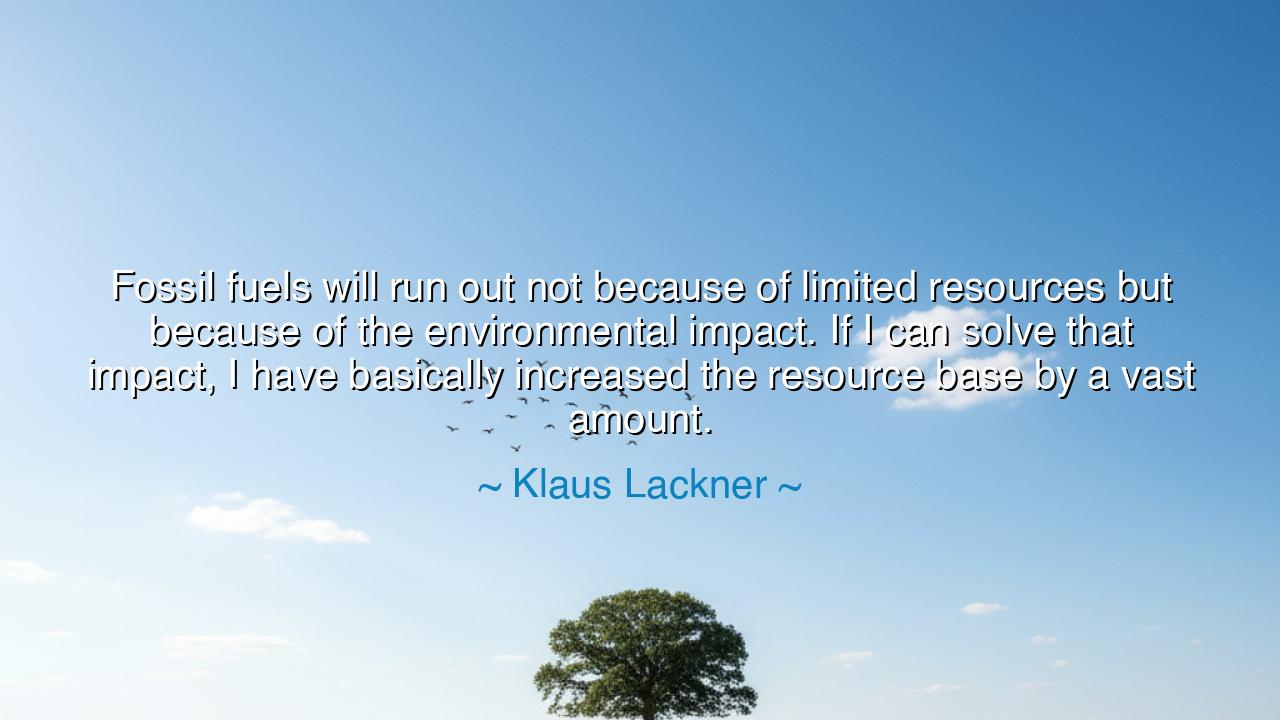
Fossil fuels will run out not because of limited resources but
Fossil fuels will run out not because of limited resources but because of the environmental impact. If I can solve that impact, I have basically increased the resource base by a vast amount.






Hear the profound words of Klaus Lackner, spoken with the clarity of one who peers far beyond the horizon: “Fossil fuels will run out not because of limited resources but because of the environmental impact. If I can solve that impact, I have basically increased the resource base by a vast amount.” At first, these words may sound like a paradox, yet they carry within them the weight of truth. He tells us that the true limit of our age is not the depth of the earth’s reserves, but the burden of their consequence. It is not scarcity that will break us, but the scars we carve upon the sky, the sea, and the soil.
In ancient times, men feared the exhaustion of their stores—grain, water, metals—and they believed collapse would come when the baskets were empty or the wells ran dry. But Lackner’s insight shows us that in this modern age, collapse may come even while the storehouses remain full. For what use is oil if its burning blackens the air until it chokes our lungs? What use is coal if its smoke warms the heavens until storms grow wild and seas consume the shore? Thus the environmental impact becomes the true boundary, the invisible wall against which human ambition crashes.
History itself offers a warning. The island of Easter Island once flourished with trees and life. Its people felled the forests to build and to burn, believing the resource was vast and unending. Yet long before the last seed was gone, the impact of deforestation brought hunger, conflict, and collapse. It was not merely the absence of trees, but the destruction of balance that doomed them. So too, our use of fossil fuels is not only a matter of quantity, but of balance. If balance is broken, humanity itself will stumble, though the earth still holds riches beneath its crust.
Yet Lackner does not speak only of doom—he speaks of hope. He proclaims that if the impact can be mastered, if the poisons of burning can be captured or cleansed, then the storehouse of energy expands beyond measure. This is no small dream; it is a vision of technologies that can draw carbon from the air, heal what has been harmed, and make energy abundant without destruction. Such an achievement would be as mighty as the harnessing of fire itself, for it would allow us to use the treasures of the earth without sacrificing the earth itself.
The lesson is clear: mankind’s challenge is not merely to dig deeper, but to think higher. We must not measure progress by the volume of fuel extracted, but by the wisdom with which we use it. True abundance is not in the size of the resource, but in the harmony between resource and world. To solve the impact is to free humanity from chains of fear, to allow energy to be a servant, not a master of ruin.
What, then, must we do? As citizens, we must champion innovation that heals, not merely consumes. We must support those who build new engines, capture carbon, and turn waste into renewal. We must live with mindfulness, conserving where we can, and demanding from leaders and businesses a vision beyond the next profit or election. Every action that reduces harm—whether in household, city, or nation—becomes a stone in the foundation of this future.
Therefore, children of tomorrow, remember this: the limit of fossil fuels is not the earth’s refusal, but our own recklessness. If we master the impact, we master abundance. If we ignore it, the wealth beneath our feet becomes poison rather than treasure. Klaus Lackner’s words remind us that salvation lies not in endless digging, but in wisdom, restraint, and the courage to invent anew. Take this teaching to heart: pursue balance, embrace innovation, and guard the earth as both gift and responsibility. Only then shall energy serve life, and not consume it.






AAdministratorAdministrator
Welcome, honored guests. Please leave a comment, we will respond soon